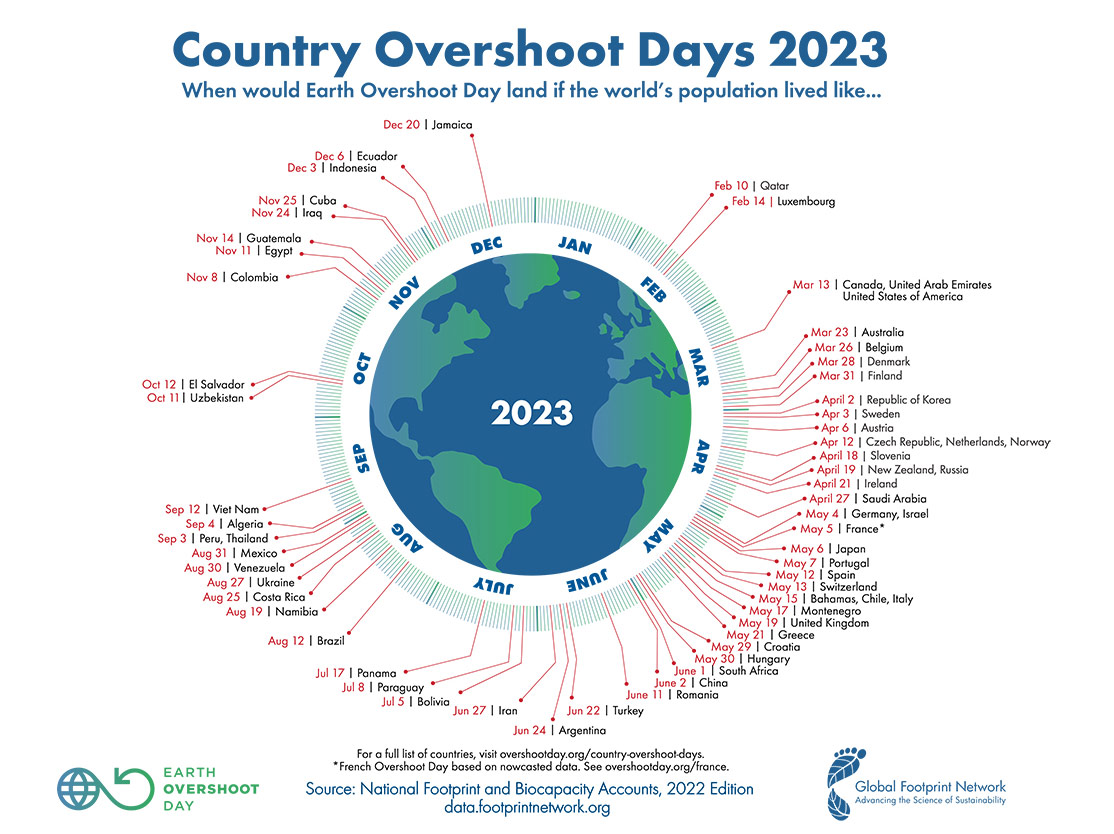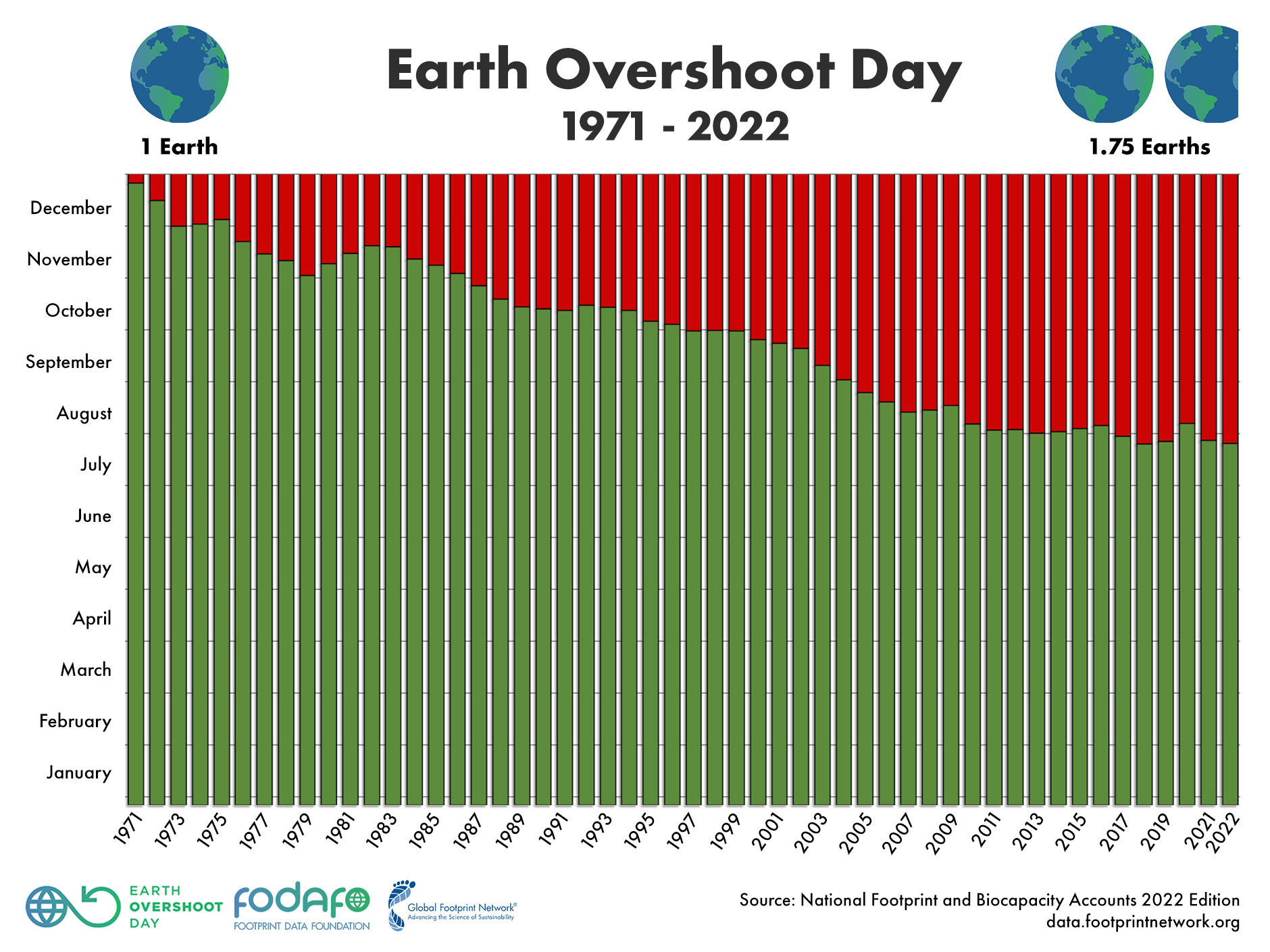
Why ecological overshoot matters and what businesses can do about it
In debt
We are in a debt crisis. Every year, humanity uses up more ecological resources and services than the Earth can regenerate. Earth Overshoot Day marks the date that we go into the red. In 2023, for the world as a whole, this happens on 28 July; in the Netherlands this year, it happens on 12 April.
For many, the fact that human consumption of resources exceeds ecological limits won’t be news. However, Earth Overshoot Day brings home how deep this debt crisis is. In the Netherlands, we have used up our ‘bank balance’ on the 102nd day of the year, when we are not even one-third in. And this doesn’t happen just once, but year after year.
Let’s draw the comparison with a financial debt. Under the European Growth and Stability Pact, all Euro-area countries must adhere to a public deficit that is no more than 3 percent of their GDP. Imagine that a country would run a deficit of more than 70 percent! And while high-potential start-up companies can run at a loss for several years, no company could sustain such an imbalance between expenditure and income.

Why ecological overshoot matters for the business community
Many of the things that businesses take for granted – fresh air, clean water, fertile soils – depend on healthy natural ecosystems. Analysis by Swiss Re suggests that 55 percent of global GDP is moderately to highly dependent on intact ecosystems. In fact, it is difficult to imagine a company that would not be affected in some way by the collapse of natural ecosystems.
Imagine that continued soil degradation would make large swathes of farmland unproductive. Companies in the food sector – the farmers, food companies, shipping companies and traders – would be affected immediately through lower yields. The drop in food production would have important knock-on effects, as was experienced last year. Food prices would rise and so would inflation and the cost of living. The additional pressure on already strained livelihoods could contribute to social unrest. Central banks would need to take further action to rein in inflation, with the risk of exacerbating pressures on the financial sector.
Two priorities for pushing back Overshoot Day
As business activity depends on nature, companies can also directly contribute to pushing back Overshoot Day and reduce the systemic risk of natural ecosystem collapse. This requires that they simultaneously reduce negative impacts and increase positive contributions.
Firstly, companies must map their negative impacts and excessive demands on nature and reduce these by finding efficiencies and adopting circular business practices that reduce the need for virgin resources through sustainable design, extending the lifetime of products and recovering and reusing products, components and materials.
This starts with identifying and measuring the impacts of the company’s business activities, within its own operations and across the value chain. With a good understanding of impacts, companies can set priorities and define targets that reflect the scale of the challenge. From this follows the action agenda, which sets out a programme of measures that rapidly reduces consumption of virgin resources.
Secondly, companies need to identify where they can contribute to regenerating nature. Regenerative business improves or increases the natural system that it operates in. It is increasingly common in agriculture, where farmers adopt practices that enhance soil quality, sequester carbon, or retail water, for example. But there are many other areas where it can be applied. Infrastructure projects, for instance, can enhance biodiversity by integrating features that are attractive to different plants and animals in the design.
To adopt regenerative practices, companies must first identify which natural resources or ecosystems it can contribute to and what assets of strengths they can bring to the challenge. With these insights, they can develop a programme of measures that create positive impact.

Balancing the books
Solving the ecological debt crisis won’t happen overnight. If we want to celebrate Earth Overshoot Day on New Year’s Eve in 2050, we need to push it back by almost 10 days every year. Luckily, many of the solutions exist and have been applied successfully. It’s time to start scaling them more rapidly.
Author: Sytze Dijkstra, Netherlands Country Manager, Simply Sustainable
